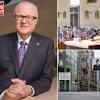Nation commemorates Anzac Day to remember the fallen

Veterans marched around Australia as citizens commemorated across the world in sombre remembrance and pride for the fallen in the epoch-changing wars of the last century and other conflicts.
More than 1000 veterans started their march at the top of Anzac Parade against the backdrop of the Australian War Memorial in Canberra, after 32,000 people attended the dawn service in front of the national landmark.
There were more than 40,000 people at Melbourne’s dawn service, with about 10,000 others later taking part in the march.
In excess of 10,000 people bowed their heads at the early morning Sydney service, where about 8000 serving members and veterans marched.
A RAAF flyover in the nation’s capital came as onlookers cheered on the marching veterans.
Army chaplain Phil Riley commemorated the Anzac legend on Thursday ahead of Governor-General David Hurley and New Zealand’s High Commissioner to Australia Andrew Needs laying wreaths at the Stone of Remembrance.
“At this hour, on this day, 109 years ago, the Australian and New Zealand Army Corps, at Gallipoli, made immortal the name of Anzac and established an imperishable tradition of selfless service,” the chaplain said at the dawn service.
Vice Australian Defence Force chief David Johnston asked all Australians to remember the families who mourned on Anzac Day.

“I ask you all to hold in your hearts those who mourn on Anzac Day and remember those whose service left them wounded in body, mind, or spirit,” he said.
Navy Commander Kylie Schulstad, who will reach 20 years of service this year, paid tribute to those she served with and those who came before her.
“Very proud,” her 10-year-old daughter Daisy said.
James Fry, who wore the medals of his late great grandfather who fought in New Guinea in World War II, highlighted the importance of remembering the sacrifices of the men and women who served their nation.
“I always like to be here in his name,” he said.
Australians also gathered at memorials across the world where Anzac forces once fought.
About 800 people took part in a dawn service at Isurava in Papua New Guinea along the Kokoda Trail.
Among them were Prime Minister Anthony Albanese, who had spent the previous two days hiking along the mountainous route, which was the site of intense fighting in 1942.
“Anzac Day has never asked us to exalt in the glories of war,” he said at the service.
“Anzac Day asks us to stand against the erosion of time and to hold on to their names, to hold on to their deeds.”

More than 1600 people watched dawn service commemorations at Anzac Cove in Gallipoli, while almost 2000 remembered the fallen at the Australian National Memorial in France.
Defence Minister Richard Marles commemorated fallen Anzacs on the shores of Gallipoli.
“When we think about the Gallipoli campaign, we think of mateship and sacrifice, and we admire the extraordinary actions of the Anzac soldiers,” he said.
Opposition Leader Peter Dutton also paid tribute, saying Australian and New Zealand soldiers exemplified bravery, mateship and endurance.
On Anzac Day, we acknowledge the deeds of all Australians who have served in wars, conflicts and peacekeeping operations throughout our history.
We honour the memories of the more than 103,000 Australians who made the ultimate sacrifice.
The Anzac spirit has helped us to… pic.twitter.com/QSdICMBtCe
— Peter Dutton (@PeterDutton_MP) April 24, 2024
“On this sacred day, we honour the memories of the more than 103,000 Australians who made the ultimate sacrifice,” he said.
Australia’s freedom and prosperity came off the back of what the Anzacs fought for, opposition defence spokesman and former soldier Andrew Hastie said.
“This Anzac Day, we remember and honour the brave soldiers, sailors and airmen who have defended Australia in war and peace, and those who continue to do so,” he said.
Lifeline 13 11 14
Open Arms 1800 011 046


 United Kingdom
United Kingdom Argentina
Argentina  Australia
Australia  Austria
Austria  Brazil
Brazil  Canada
Canada  Germany
Germany  Ireland
Ireland  Italy
Italy  Malaysia
Malaysia  Mexico
Mexico  New Zealand
New Zealand  Poland
Poland  South Africa
South Africa  United States
United States 



















